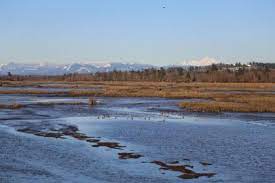Washington U.S. Sens. Maria Cantwell and Patty Murray announced $36 million in grant funds to state, local, Tribal and federal partners to support the continued conservation and restoration of Puget Sound.
The funding was awarded from the Environmental Protection Agency’s National Estuary Program and the Puget Sound Geographic Funds to support development and implementation of the Puget Sound Action Agenda.
“With this $36 million investment in Puget Sound, government agencies and Tribes will work to stop stormwater pollution, improve water quality, restore habitat and accelerate the recovery of our salmon and orca populations. This investment will help provide a healthier Puget Sound for our people, our economy and our wildlife,” said Cantwell.
The total $36 million will be allocated to the following programs:
–$8.5 million to the Puget Sound Partnership. The Puget Sound Partnership will also receive $900,000 in Infrastructure Law funding.
–$7 million to 19 federally recognized Tribes, the Northwest Indian Fisheries Commission, Skagit River System Cooperative and Point no Point Treaty Council
–$7.2 million to the Washington Department of Fish and Wildlife and Washington Department of Natural Resources for habitat recovery
–$5.7 million to the Department of Ecology for stormwater work, including transportation runoff
–$4.5 million to Washington Department of Health for shellfish restoration and pathogen reduction
–$3.3 million in Infrastructure Law funding for federal science through Interagency Agreements with NOAA, USGS, USFS and DOE
According to EPA, Congress has appropriated over $420 million in Clean Water Act National Estuary Program and Geographic Program funds for Puget Sound since 2006. State, local, Tribal and federal partners have used these funds to leverage nearly $2.1 billion of additional funds largely from the state of Washington.
These grants have helped restore more than 50,000 acres of habitat, increased protection of over 150,000 acres of harvestable shellfish beds, and funded cutting edge research on chemicals in automobiles and roadway runoff.

